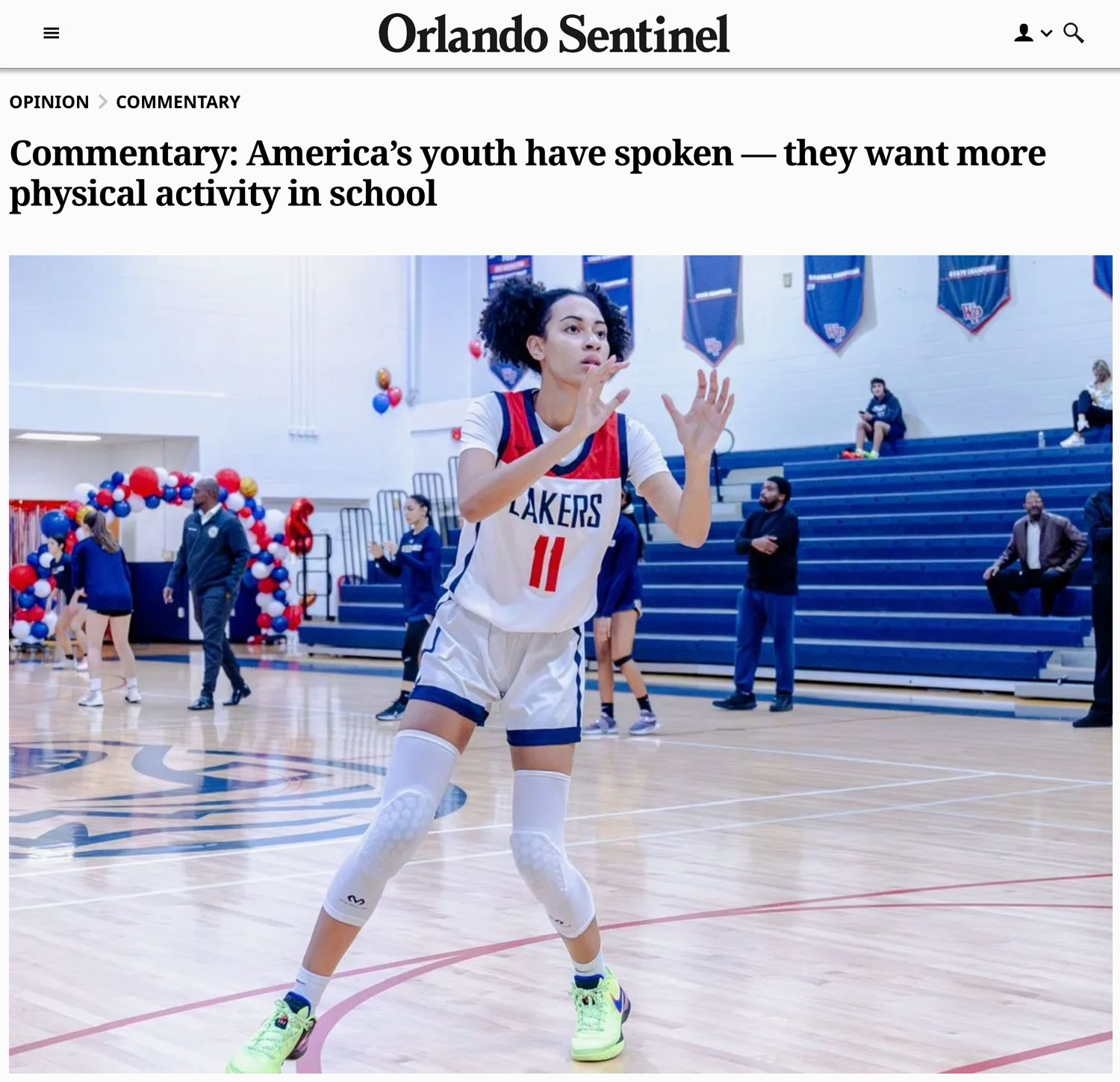By JAYNE GREENBERG AND MORGAN BRIDGES (shown above)
Originally Published September 1, 2024, in the Orlando Sentinel
For decades, we’ve been aware of the increase in sedentary behavior among American young people. However, understanding of the reasons behind the inactivity crisis has been elusive. The national youth wellness nonprofit with whom we work, GENYOUth, recently surveyed over 1,000 middle and high school students about their physical activity. The findings are illuminating.
Fully 85% of youth surveyed do not meet the recommended guidelines for daily physical activity. Among the reasons they cite: 36% report that excessive schoolwork consumes their time; 21% have competing activities; 20% simply do not prioritize physical activity; and another 20% feel too tired or lack energy.
While physical education is the primary setting where youth are active, an alarmingly low 54% of surveyed students participate in physical education at all. The data reveals a troubling decline in P.E. participation from elementary to high school, with many students enrolling in P.E. only to meet graduation requirements. The decline is concerning, especially when you learn that fewer than half of students (47%) say they view physical education positively, and 59% of female students “dread” the requirement.
Concerningly, Florida ranks 42nd out of 50 states in youth physical activity. Statewide, just 17.9% of children aged 6-17 are physically active at least 60 minutes every day, according to the Department of Health and Human Services’ National Survey of Children’s Health. And for high school specifically, according to CDC figures, just 14% of girls and 31% of boys in Florida are meeting the 60-minute recommended daily minimum.
Nevertheless, Florida gets an “A” this year for having both mandatory physical education and recess mandates firmly in place in the state’s 2024 statutes. These statutes, which cover Grades K-12, provide detailed, time-specific, and grade-specific P.E. requirements, as well as requirements for safe, unstructured, free-play recess.
Perhaps that’s why GENYOUth has responded this year to a wave of requests from Florida’s dedicated P.E. teachers for NFL FLAG-in-School flag-football kits from an impressive 31% of Florida schools, reaching 40% of Florida students (1,290,452). In Orlando alone, these free kits and accompanying curricula serve 271 schools with 192,062 enrolled students. A whopping 61% of Orange County Public Schools (133) received FLAG-In-School kits, reaching 108,613 students. Happily, the game is especially popular with girls.
The good news? Students do express a desire for more opportunities to take P.E. classes, and they absolutely recognize the benefits that physical activity brings – it impacts fitness, mood, appearance, self-confidence and academic performance. As evidenced by the popularity of NFL FLAG-In-School, what students don’t want is the same old P.E.
They want activities that are fun, social, inclusive and that go beyond often pressure-filled competitive team sports. They crave offerings that include instruction on achieving specific goals, maintaining a healthy lifestyle, and better nutrition. Even having the option to select P.E. class as their last period of the day would go a long way in alleviating the self-consciousness many kids have around showering in school.
Notably, the role of P.E. teachers emerged in this survey as critical, with 42% of students saying they want teachers who will guide them toward activities they can succeed in; who can support less skilled students; and who can inspire in everyone a love for sports and movement, not just the athletically inclined.
So where do we go from here? As policymakers, educators, students, administrators, and parents, we must advocate collectively and vigorously for quality physical education and physical activity in schools. This implies the need for several things: strong and consistent state and federal P.E. policies; more opportunities and diverse course offerings; adequate funding for equipment and supplies; and certified physical education teachers and coaches who are present at every school. Let’s heed the warnings and listen to those who know youthful needs best: students themselves. Their voices are clear, and it’s time we hear them and act.
Jayne Greenberg is the North America Chair for the International Sport and Culture Association and was the District Director of Physical Education and Health Literacy for Miami-Dade County Public Schools for 22 years. She is a member of GENYOUth’s Insights Advisory Council. Morgan Bridges, who will enter the University of Central Florida this fall, is a graduate member of GENYOUth’s National Youth Council.
